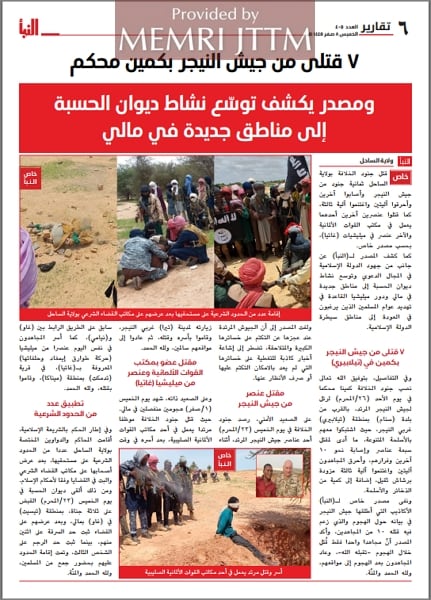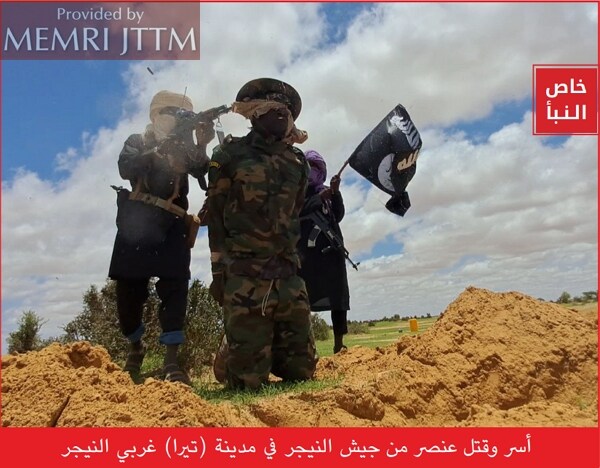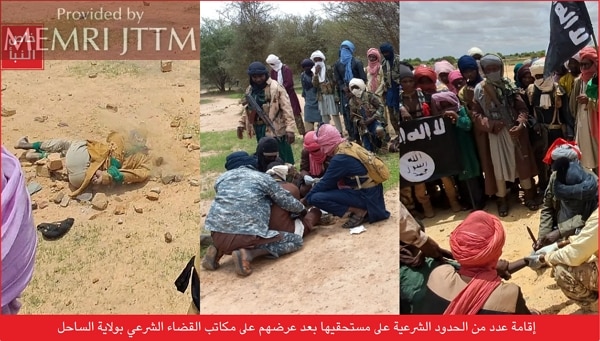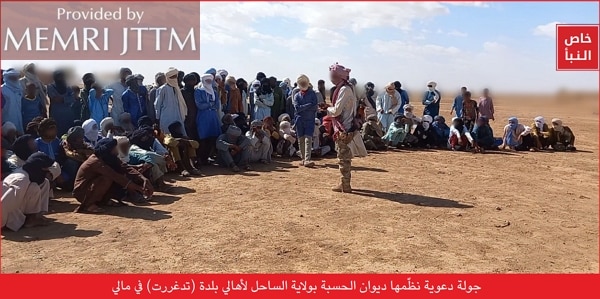The following report is now a complimentary offering from MEMRI's Jihad and Terrorism Threat Monitor (JTTM). For JTTM subscription information, click here.
Issue 405 of Islamic State (ISIS) weekly magazine Al-Naba', which was published on August 24, 2023,[1] contains a two-page article detailing recent activities of the Islamic State Sahel Province in Niger and Mali. In addition to attacks targeting Nigerien soldiers, the pro-Malian government militia, Imghad Tuareg Self-Defense Group and Allies (Groupe d'Autodéfense Tuareg Imghad et Alliés – GATIA), and a staffer executed for allegedly working for German forces, the article – citing an "exclusive source" – describes how the ISIS province's hisbah (morality police) bureau carried out several executions and amputations of alleged criminals, as well as extended its presence northward into new areas. Al-Naba' accuses Al-Qaeda affiliate Jama'at Nusrat Al-Islam Wal-Muslimeen (the Group for Support of Islam and Muslims – GSIM) of forcibly displacing civilians from parts of Mali, claiming that the ISIS province's upholding law and order has induced many to return, and that the Al-Qaeda affiliate has massacred some civilians on charges of collaborating with ISIS.

Above is the first page of the Al-Naba' article.
Killing Nigerien Soldiers, Staffer Who Worked For German Forces, Member Of GATIA Militia
The article first mentions several attacks perpetrated by the ISIS province's operatives, one of them previously claimed in official ISIS media.
In a previously claimed attack,[2] the group's fighters ambushed a Nigerien Army convoy on August 13 near Sanam in the country's western Tillabéri Region, killing seven soldiers and wounding about ten more. The mujahideen also set fire to two vehicles, as well as captured a third vehicle equipped with a heavy machine gun, along with weapons and ammunition.
The Al-Naba' article adds that one of the mujahideen was killed in the encounter, rejecting a statement by the Nigerien army that ten were killed as a lie and claiming that the "apostate armies [...] resort to spreading false reports to cover up their losses, which can no longer be concealed or ignored."
On August 10, the mujahideen observed another Nigerien soldier visiting the town of Téra, Tillabéri Region, and captured and killed him before returning to their positions unharmed.

On August 17, ISIS fighters in Mali killed an "apostate staffer" who had worked in "one of the offices of the crusader German forces," and been captured earlier on the road between Gao, Mali and Niamey, Niger. On the same day, the group's fighters captured and killed a fighter for the pro-government GATIA militia in Tadamakt, Ménaka Region.

The above "exclusive" photo published in Al-Naba' shows the staffer being executed by an ISIS firing squad; the inset photo apparently shows the same man posing with a German soldier.
Thieves And Adulterers Punished According To Shari'a With Execution And Amputation
The same ISIS source described to Al-Naba' how the "courts and bureaus dedicated to the Sahel Province" implemented several hudoud [penalties for violations of shari'a, such as executions and amputations] after "presenting [the guilty parties] to the offices of the shari'a judiciary and deciding the cases in accordance with the laws of Islam."
On August 10, the province's hisbah bureau captured three "criminals" in Tessit, Gao Region. After a trial, two were found guilty of theft and a third of adultery. The thieves were punished according to shari'a with the amputation of their hands, while the adulterer was stoned to death. The penalties were carried out in the presence of "a crowd of Muslims."
Another thief was apprehended on August 14 near Ansongo, Gao Region, and also punished with amputation in front of a crowd. On August 18, the hisbah bureau captured two more thieves in Ménaka Region and amputated their hands in the Tabankort town market.

The above photo collage from Al-Naba' shows a man stoned to death for adultery (left) and two men having their hands amputated for theft in two separate locations.
Preaching Tours To Explain "Truth" About ISIS To Civilians Displaced By GSIM Who Have Returned To Their Homes Following ISIS Takeover
In addition, the article reports that the hisbah bureau organized "da'wah [preaching] tours" during the middle and end of Muharram (late July-early August) to the town of Tadgharart in northern Ménaka Region and the surrounding area, in "the first arrival of [ISIS] mujahideen to that area." The article claims that most residents of the area had been forcibly displaced by members of Al-Qaeda affiliate GSIM, who, while withdrawing from the area after the failure of their military campaigns against ISIS, told locals that the rival group's members were Khawarij[3] who "would kill anyone they found in their way." The ISIS propaganda campaign in northern Ménaka aims to "explain the truth about the Islamic State and its methodology to the common Muslims" who were exposed to the "disinformation and deception" of GSIM, which "desperately tries to stop the Muslim sons from joining the ranks of the Islamic State."

The above photo shows a member of the ISIS Sahel Province's hisbah bureau preaching to a crowd of civilians in Tadgharart.
During the same month, ISIS Sahel Province operatives captured a group of "highway robbers and human traffickers." The mujahideen freed "one of the common Muslims" and returned him to his family unharmed, as well as implementing the hudoud for theft and highway robbery in towns and markets, thereby "putting an end to many of the crimes that had been widespread."
Al-Naba' states that due to these "blessed steps" taken by ISIS operatives to "provide security and protection for these areas," many Muslims have made their way back to their homes after being displaced by "threats and disinformation of the Al-Qaeda militia." Markets have returned to operation, showing locals "the opposite of the lies, defamation, and distortion of facts which Al-Qaeda commanders and soldiers fabricated." However, the article claims, GSIM threatened the civilians who returned to their homes after they came under ISIS control, declaring that it would consider them like the Khawarij and that those who "support or collaborate with the [ISIS] mujahideen" would be killed. Accusing the Al-Qaeda affiliate of making good on such threats, Al-Naba' adds that this explains the reasons behind "the massacres which the militia perpetrates against common Muslims."
In recent months, the ISIS Sahel Province has reported several executions carried out by its hisbah bureau in various areas under its control.[4] The province's employment of a hisbah bureau to identify and punish violators of Islamic law is one of the ways it demonstrates its legitimacy as an Islamic quasi-state with its own institutions, as the Islamic State West Africa Province (ISWAP) currently does in parts of Nigeria and as ISIS did in Iraq and Syria during its heyday.[5]
[1] Telegram, August 25, 2023.
[2] Telegram, August 22, 2023.
[3] The Kharijites, or Khawarij (literally, "those who go out"), were an early Islamic sect which pronounced Muslims apostates for committing even minor sins and was proclaimed heretical by the mainstream Sunnah. Today the term is used pejoratively by Muslims to denounce jihadi groups they view as extremist, specifically ISIS.
[4] See MEMRI JTTM Reports: Islamic State (ISIS) Weekly Highlights Sahel Province Morality Police Activities, Claims Executing 'Spies' In Niger, Abducting Christians In Northeastern Burkina Faso, July 28, 2023; Islamic State (ISIS) Weekly Claims Islamic State Sahel Province Killed More Than 40 Al-Qaeda Affiliate GSIM members, Captured Spy Cell For Wagner Group, Killed Criminals Affiliated With Tuareg Rebel Group, August 7, 2023; and In The Aftermath Of The Coup In Niger, Jihadis Eye Exacerbating Instability In Sahel, Celebrate 'Terrific Gains' In Region, Claim Advent Of Russia-Backed Wagner Group Would Draw Locals Towards Jihadis, August 24, 2023.
[5] See MEMRI JTTM Reports: ISIS Video Documents Attacks On Nigerian Army, Highlights ISIS Preachers' Outreach Efforts Among Locals, Including Children; Hisbah Police; Zakat Distribution, June 14, 2022; and Islamic State (ISIS) In 2022: Growing Threat Continuing Into 2023, January 8, 2023.
The full text of this post is available to subscribers.
Please login or register to request subscription information from MEMRI



